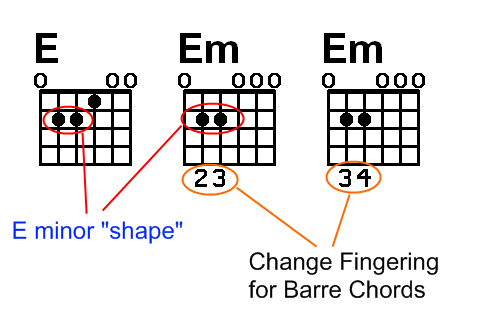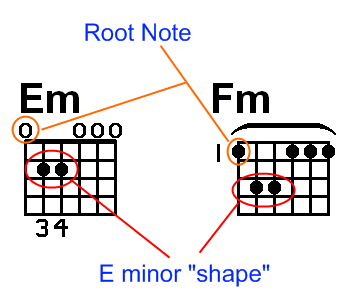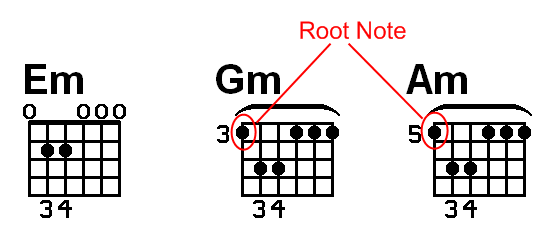"Minor" Barre Chords ("E" Shape)
Lesson Goals:
♦ Learn the "minor" barre chord shape
♦ Compare open Em to minor barre chords
♦ Learn Fm, Gm and Am barre chords
In this lesson we will learn some "minor" barre chords. Just like the major barre chords we worked on in the last few lessons, the main "shapes" for minor barre chords can be compared to the "minor" chord formations of the open "E" and "A" chords.
Let's first take a look at a comparison between the open E chord and Em chord.

You may remember that to form an open Em chord, all you have to do is form an E major chord then lift your first finger.
Notice the "shape" of the Em chord. This is the shape that we will apply to minor barre chords higher up the neck of the guitar. This is the same principle we applied to the "shape" of major barre chords using the "E" major shape.
Also notice in the above diagram that, like the "E" major shape, we will need to make an adjustment on our fingering to free up the 1st (index) finger so that it can make the "bar".
Now let's look at the diagram below.

The above diagram illustrates how we can take the Em open chord and slide it up one fret to make a bar chord. In this case, because the root note is on the 1st fret of the 6th string we are now playing an Fm barre chord.
The following diagram continues that thought further up the neck. If we slide the Fm barre chord (from the previous diagram), up two frets so that the new root note is on the 3rd fret of the 6th string, we would now be playing a Gm (barre) chord.
Two frets up from the Gm would put us at the 5th fret of the 6th string which would be an Am (barre) chord.

You could continue doing that right on up the length of the guitar neck just by knowing the names of the notes on the 6th string.
Take a moment and work on playing the Gm and Am barre chords.
